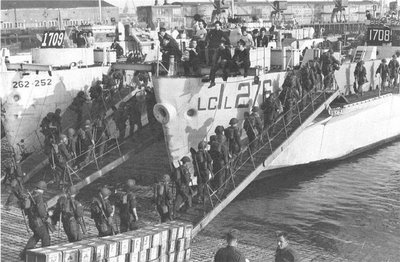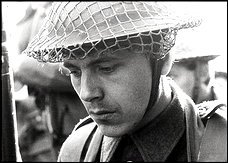 Overlord (1975)
Overlord (1975)Director: Stuart Cooper
Over the Memorial Day weekend, I tucked into a few war movies, including my first-ever viewing of the ripping epic The Longest Day (1962). This film covers D-Day from every possible angle--English, American, German, French--and took three directors to craft. Its all-star cast of action heroes (a leaden John Wayne, a diffident Robert Mitchum, a very young and exuberant Sean Connery, and many more) ranged over the wide theatre of the war with panache, while the expert script team (including From Here to Eternity author James Jones) supplied a pretty accurate accounting for them to portray.
I feel fortunate to have seen The Longest Day so soon before seeing Overlord, with its decidedly different angle on Operation Overlord, a.k.a. D-Day. The Longest Day goes out of its way to explain the strategy and events on all fronts, even including a German war strategist who does nothing all day but dream up different battle scenarios, one of which involves an "unlikely" assault at Normandy. Overlord is a unique mix of imagination and actual World War II footage that provides precious little in the way of explanation, relying instead on evocative sounds and images to provide character motivation and mood. Knowing more about the lay of the land, so to speak, from The Longest Day, helped deepen my appreciation for this moody, mournful film.
The movie opens with a completely dark screen. All we hear is a persistent crunching, metallic scrapes, and engines cranking. Eventually the screen comes up on platoons of German soldiers moving along with their panzers and cannons along rural roads. They look as mechanized as the sounds we were forced to concentrate on by director Cooper. We see aerial footage of Paris, its streets empty, its Arch of Triumph the only place where human life can be seen--tiny figures that are undoubtedly German moving along its summit. Finally, we see Hitler looking out an airplane window, surveying his new conquest. This documentary bit of scene setting, done without comment, is grim--a real look at what all the fighting was about.
The scene switches to a young man named Tom Beddows (Brian Stirner), who is pedaling his bike up a country road to a neat English home. His father asks him where he has been. "The farm," Tom answers, to get some reading material. "David Copperfield." Tom's father says he won't have much time for reading if basic training is the same for Tom as it was for him. Both men enter the house. Tom pets his Irish setter. His parents give him brave smiles and small words of advice and send him off to war.
This is a scene as ordinary as can be--and likely exactly what happened all over a world at war. Its very homeliness is what makes it so touching. We instantly feel how vulnerable Tom and others like him were and are. We begin what will be a long, sad journey of dread as Tom is introduced to the rules and rigors of soldiering.
 Tom arrives late to camp after missing his train. He gets the typical runaround by his drill sergeant, who makes him leave the barracks, knock, and ask permission to enter. Tom seems bemused, as most civilians do upon encountering the seeming illogic of the military mind. But systematically he is stripped of his civilian clothes, hair, and manners as he learns to march in formation, stamp his feet with loud authority, and fear getting out of line. The one time he breaks a rule is to stop with his mate for a smoke while out on a march. His friend talks sadly about the girl he lost, and Tom talks sadly about Tina. His dog. When Tom tries to cross a deep ravine to catch up to his fellow trainees, who have left them far behind, he knocks himself out falling down its steep sides and ends up thrown in the brig.
Tom arrives late to camp after missing his train. He gets the typical runaround by his drill sergeant, who makes him leave the barracks, knock, and ask permission to enter. Tom seems bemused, as most civilians do upon encountering the seeming illogic of the military mind. But systematically he is stripped of his civilian clothes, hair, and manners as he learns to march in formation, stamp his feet with loud authority, and fear getting out of line. The one time he breaks a rule is to stop with his mate for a smoke while out on a march. His friend talks sadly about the girl he lost, and Tom talks sadly about Tina. His dog. When Tom tries to cross a deep ravine to catch up to his fellow trainees, who have left them far behind, he knocks himself out falling down its steep sides and ends up thrown in the brig.Tom is so clearly not a soldier. He's not really even a man. He turns 21 while at camp. He runs from a chippy who tries to give him a little action at the movie theatre. He meets a girl at a dance who might be the only girl he's ever liked. Tom understands that his temperment is so at odds with the task at hand that he is certain he will be killed in battle. His mates joke about a request he put to one of the officers. Tom asked if anyone could be granted compassionate leave from training camp. The officer says, yes, under certain circumstances such as a death in the family. Tom says that nobody has died yet, but that there is about to be a death in the family and he therefore requests leave to go home and comfort his parents!
As invasion day draws nearer, we view more archival footage of the war preparations. One particularly mesmerizing scene shows the launching of a giant spool, spun across the water by something that looked like flares on its spokes and sending sheets of water flying in all directions as some kind of camoflage. Of course, more traditional amphibious equipment shares the stage with the nervous soldiers waiting to get into the war.
We also grow sadder as Tom's dreams more clearly foreshadow his death. Just before his unit is deployed, he writes to his parents that he expects to die. "I can feel it, like a cold coming on." He reasons that the news would be better coming from him than from an official telegram, but in the end, he burns the letter in the bonfire on which all the soldiers are discarding any items the enemy could use if they were confiscated. "I have nothing now," Tom muses in voiceover. He's already begun to give up the ghost.
This film focuses on the destruction and waste that is war with expert cutting between the filmed screenplay and archival footage that comprises a good third of the film. I felt extremely sad, not vengeful or convinced of the necessity of eliminating the fascist threat, in spite of graphic images of the Blitz and massive bombings. I can't really explain that reaction either, though the elegaic score by Paul Glass may have had a lot to do with it. There is something about showing violence stripped of any narrative or context that exposes it for what it is--madness. Adding the ordinary Tom, who sees his death as an inevitability and almost makes it happen in an ecstatic fantasy, contributes a Christlike sacrifice to the mix.
I've read criticisms of this film that mark it as cliche-ridden, an interesting failure. I vehemently disagree. Its very famliar story, told through an economy of words, a genius selection of images by Stanley Kubrick's cinematographer John Alcott and editor Jonathan Gili, and a very affecting performance by Brian Stirner make Overlord a fine, archetypal film of war. l


0 Comments:
Post a Comment
<< Home